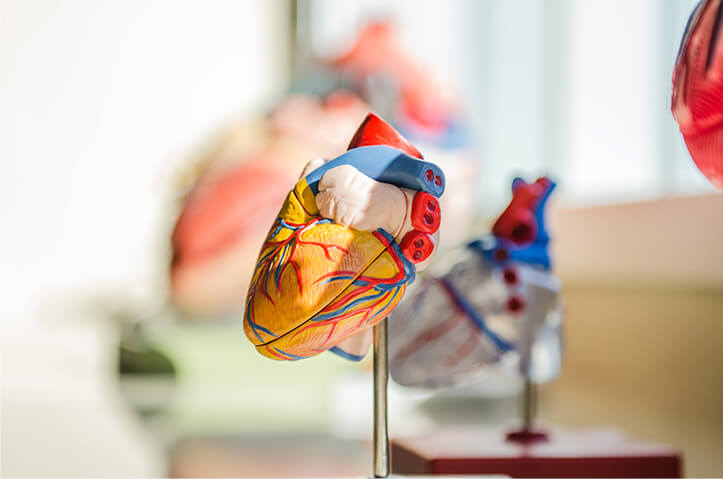
Atrial fibrillation and Lifestyle
Last update February 1, 2024
What can you do to prevent Afib?
Health scientists emphasize the pivotal role of a healthy lifestyle in disease prevention. Whether it’s heart disease or cancer: individuals with conditions like obesity, high blood pressure, and diabetes are more vulnerable compared to those without these predispositions. Adopting healthy habits in your lifestyle can result in noticeable and long-term health benefits.
Here’s what we know about lifestyle and atrial fibrillation:
The following lifestyle practices are associated with a reduction in Afib symptoms:
- A diet consisting of unprocessed and predominantly plant-based foods.
- Daily walking and cycling.
- Mindfulness exercises.
How diet affects Afib
Several studies indicate that diet plays a role in reducing atrial fibrillation symptoms. The following approaches have been found effective:
- Avoiding overeating by consuming smaller meals.
- Adhering to the Japanese diet which is characterized by fresh, natural, and unprocessed products.
- Adopting the Mediterranean diet, which includes natural fats from sources like nuts and pure ingredients.
- Opting for (organic) unprocessed foods, primarily composed of plant-based ingredients.
Supplements may also help to provide your body with more energy, potentially reducing the frequency of AF episodes. In 2022, the AFIP Foundation initiated a study involving a form of vitamin B3 and L-glutamine based on promising laboratory results (study 1, study 2, and study 3). Learn more on our page about Afib and diet.
Exercise for a healthy heart
Daily physical activity is crucial to maintaining a healthy heart and overall well-being. Just 30 minutes of (brisk) walking or cycling each day can have positive effects. Light to moderate exercises, like yoga and daily walks, have been linked to positive outcomes but long-term intense exercise may cause adverse effects and increased atrial fibrillation due to the stress inflicted on the heart muscle.
Meditative exercise and Afib
Researchers are increasingly focusing on complementary methods to alleviate symptoms of atrial fibrillation. Additional methods include meditative exercises such as yoga, tai chi, and qigong. All these practices have demonstrated beneficial effects on heart rate, cardiac condition, and slowing the aging process, contributing positively to the reduction of atrial fibrillation (study 1, study 2, and study 3).
Stress and anxiety as triggers for Afib
Many individuals with atrial fibrillation report stress as a significant trigger for episodes. Stress often manifests as a feeling of anxiety. Meditation, cognitive-behavioral therapy, and interoceptive exposure exercises can have a favorable impact on reducing stress and anxiety, thereby assisting in the reduction of atrial fibrillation (study 1, study 2, study 3, and study 4).
Despite the long-known link between stress, anxiety, and atrial fibrillation, there is limited research on the precise consequences of stress on the heart. The AFIP Foundation is conducting an investigation into the role of stress in atrial fibrillation. Topics included in the study are:
- Types of stress as triggers for atrial fibrillation.
- Symptom patterns of individuals with stress and atrial fibrillation.
- Activities that help alleviate stress.
- The physiological effect of stress on atrial heart cell function.
Share your experience with stress by completing the stress and atrial fibrillation survey.
References
- Starreveld, R., Ramos, K. S., Muskens, A. J. Q. M., Brundel, B. J. J. M., & de Groot, N. M. S. (2020). Daily Supplementation of L-Glutamine in Atrial Fibrillation Patients: The Effect on Heat Shock Proteins and Metabolites. Cells, 9(7), 1729. https://doi.org/10.3390/cells9071729
- Seccia, T. M., & Calò, L. A. (2018). Is exercise becoming a danger for our health? The complex relationship between exercise and atrial fibrillation. European journal of preventive cardiology, 25(6), 621–623. https://doi.org/10.1177/2047487318762445
- Zhang, D., Wu, C., Qi, X., Meijering, R. A. M., Hoogstra-Berends, F., Tadevosyan, A., … & Brundel, B. J. J. M. (2014). Activation of histone deacetylase-6 induces contractile dysfunction through derailment of α-tubulin proteostasis in experimental and human atrial fibrillation. Circulation, 129(3), 346-358. https://doi.org/10.1161/circulationaha.113.005300
- Zhang, D., Hu, X., Li, J., Liu, J., Baks-Te Bulte, L., Wiersma, M., Malik, N. U., van Marion, D. M. S., Tolouee, M., Hoogstra-Berends, F., Lanters, E. A. H., van Roon, A. M., de Vries, A. A. F., Pijnappels, D. A., de Groot, N. M. S., Henning, R. H., & Brundel, B. J. J. M. (2019). DNA damage-induced PARP1 activation confers cardiomyocyte dysfunction through NAD+ depletion in experimental atrial fibrillation. Nature communications, 10(1), 1307. https://doi.org/10.1038/s41467-019-09014-2
- Pool, L., Wijdeveld, L. F. J. M., de Groot, N. M. S., & Brundel, B. J. J. M. (2021). The Role of Mitochondrial Dysfunction in Atrial Fibrillation: Translation to Druggable Target and Biomarker Discovery. International journal of molecular sciences, 22(16), 8463. https://doi.org/10.3390/ijms22168463
- Morseth, B., Løchen, M. L., Ariansen, I., Myrstad, M., & Thelle, D. S. (2018). The ambiguity of physical activity, exercise and atrial fibrillation. European journal of preventive cardiology, 25(6), 624–636. https://doi.org/10.1177/2047487318754930
- Chung, M. K., Eckhardt, L. L., Chen, L. Y., Ahmed, H. M., Gopinathannair, R., Joglar, J. A., … & Biology, V. (2020). Lifestyle and risk factor modification for reduction of atrial fibrillation: a scientific statement from the american heart association. Circulation, 141(16). https://doi.org/10.1161/cir.0000000000000748
- Tolahunase, M., Sagar, R., & Dada, R. (2017). Impact of Yoga and Meditation on Cellular Aging in Apparently Healthy Individuals: A Prospective, Open-Label Single-Arm Exploratory Study. Oxidative medicine and cellular longevity, 2017, 7928981. https://doi.org/10.1155/2017/7928981
- Kanmanthareddy, A., Reddy, M., Ponnaganti, G., Sanjani, H. P., Koripalli, S., Adabala, N., Buddam, A., Janga, P., Lakkireddy, T., Bommana, S., Vallakati, A., Atkins, D., & Lakkireddy, D. (2015). Alternative medicine in atrial fibrillation treatment-Yoga, acupuncture, biofeedback and more. Journal of thoracic disease, 7(2), 185–192. https://doi.org/10.3978/j.issn.2072-1439.2015.01.13
- Oser, M., Khan, A. J., Kolodziej, M. S., Gruner, G., Barsky, A. J., & Epstein, L. M. (2019). Mindfulness and interoceptive exposure therapy for anxiety sensitivity in atrial fibrillation: a pilot study. Behavior Modification, 45(3), 462-479. https://doi.org/10.1177/0145445519877619
- Reavell, J., Hopkinson, M. D., Clarkesmith, D., & Lane, D. A. (2018). Effectiveness of cognitive behavioral therapy for depression and anxiety in patients with cardiovascular disease: a systematic review and meta-analysis. Psychosomatic Medicine, 80(8), 742-753. https://doi.org/10.1097/psy.0000000000000626
- Dossett, M. L., Needles, E. W., Donahue, Z., Gadenne, G., Macklin, E. A., Ruskin, J. N., & Denninger, J. W. (2021). A SMART approach to reducing paroxysmal atrial fibrillation symptoms: Results from a pilot randomized controlled trial. Heart rhythm O2, 2(4), 326–332. https://doi.org/10.1016/j.hroo.2021.06.003
- Malm, D., Fridlund, B., Ekblad, H., Karlström, P., Hag, E., & Pakpour, A. H. (2018). Effects of brief mindfulness-based cognitive behavioural therapy on health-related quality of life and sense of coherence in atrial fibrillation patients. European Journal of Cardiovascular Nursing, 17(7), 589-597. https://doi.org/10.1177/1474515118762796
Share this article
















